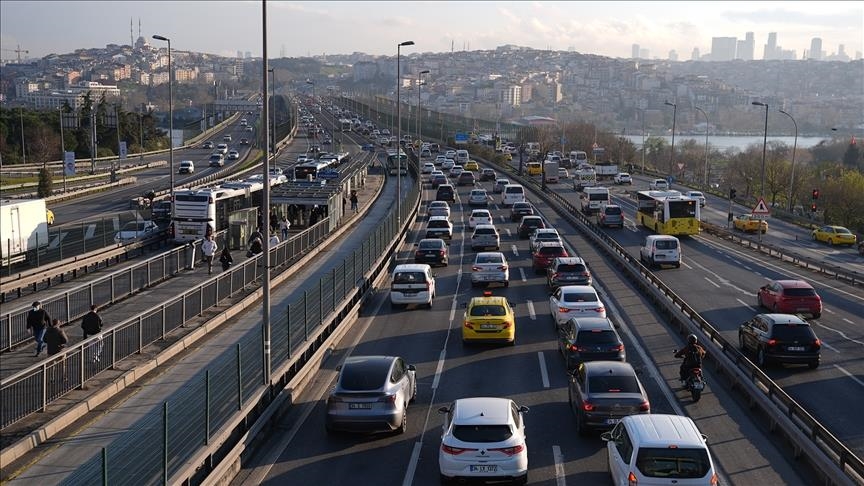Istanbul traffic congestion costs economy up to $7B a year, experts say
Building more roads won’t solve Istanbul’s traffic woes -- it only delays problem, civil engineering professor tells Anadolu

ISTANBUL
Istanbul’s traffic congestion is costing the city’s economy an estimated $6 billion to $7 billion a year, experts warned, urging authorities to shift focus from building roads to managing demand.
In an interview with Anadolu, Selim Dundar, an associate professor of civil engineering at Istanbul Okan University, said the city’s traffic system is overwhelmed because the number of vehicles has exceeded the capacity of its roads.
“The more vehicles there are, the heavier the traffic gets,” Dundar said. He noted that illegal parking, unsafe lane changes and other driving violations contribute to the problem.
Traffic congestion affects more than commute times, he said. The economic toll includes increased fuel use, vehicle maintenance, accident risks, pollution and loss of productivity, along with stress and other health impacts.
Dundar cited a 2018 study that estimated the cost of traffic congestion in Istanbul at $6 billion annually and said the figure likely has risen with the city’s growing population and changing transportation habits. He said current costs are closer to $6 billion to $7 billion a year.
According to the TomTom Traffic Index, Istanbul ranked as the world’s most congested city in 2023, with drivers spending 105 extra hours in traffic compared to free-flow conditions.
‘We can’t build our way out’
Dundar said simply building more roads and intersections does not solve the problem.
“It only postpones it,” he said. “When one bottleneck is eliminated, another one emerges. Adding lanes encourages more vehicle use, and within five years, the congestion often returns even worse.”
He said traffic can be better managed by staggering work hours to reduce peak-time pressure and encouraging alternatives to private cars.
“Most cars in Istanbul carry 1.5 people on average,” Dundar said. “This is a very inefficient use of road space.”
He called for greater investment in public transportation and the expansion of micromobility options such as bicycles and electric scooters. He also recommended optimizing traffic signal systems to ease urban gridlock.
Dangerous driving normalized
Yasemin Usta, head of the Bursa-based My Rights in Traffic Association, said most accidents are caused by drivers who disregard rules. She cited official data from the Turkish Statistical Institute (TUIK) showing driver error accounts for 89% of crashes.
“Speeding, failing to yield, ignoring red lights, making dangerous turns—people often say they’re just in a rush,” Usta said. “But is it worth risking your life for five or 10 minutes?”
Usta said many drivers do not see traffic violations as serious offenses, even though they pose a threat to public safety.
“People feel ashamed to steal, but not to break traffic rules,” she said. “They don’t feel guilty. And once this attitude becomes normal, the risk multiplies.”
According to Usta, more than 60,000 people have been killed and more than 3 million injured in traffic crashes in Türkiye since 2015.
Anadolu Agency website contains only a portion of the news stories offered to subscribers in the AA News Broadcasting System (HAS), and in summarized form. Please contact us for subscription options.


